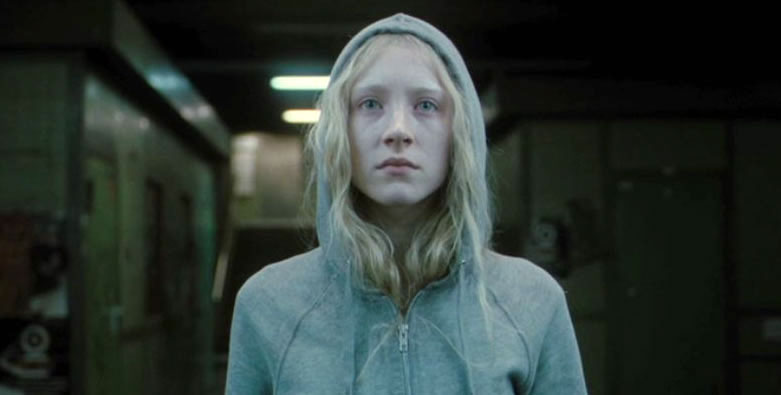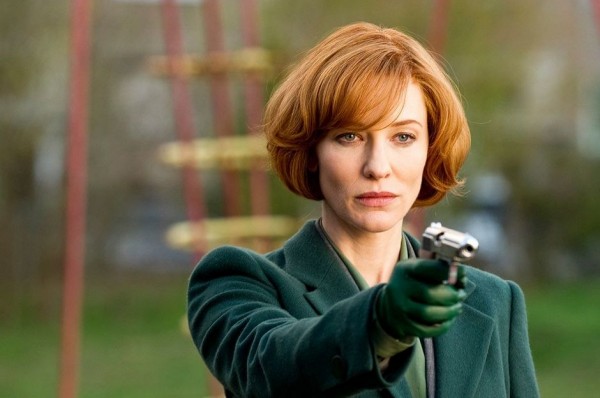Saoirse Ronan as Hanna
This independent film came and went and while a few friends mentioned it, I didn’t seem to read too much about it, a shame because the film offers a lot for a feminist viewers (Bechdel win!) in it’s portrayal of female friendship, Hanna’s coming of age, a female action hero and an interesting Cate Blanchette as the villain. While the story revolves around a familiar plot of revenge and CIA subterfuge, the screenwriter, Seth Lochhead, always intended for the film to feature elements of fairy tales, specifically the darkness that is featured in any morality tale.
Hanna is certainly suited to a Grimm fairytale ambiance; Saoirse Ronan (Hanna) is cursed with special gifts and raised by her vengeance-fueled father in a faraway land. There is a wicked witch (Cate Blanchette) who cursed her with her special abilities and who must be destroyed, Hanna’s father (Eric Bana) must then push his daughter out into the world to fulfill her cursed destiny, during which time Hanna will ultimately grow up and discover the truth about her mother.
Specifically, it was the portrayal of parents, mothers especially, that I found really interesting in the film. There are three mothers portrayed, Hanna’s mother, Hanna’s grandmother, and the mother of Hanna’s friend (Olivia Williams), all of which are shown to be absent mothers to their daughters.
Motherhood is tricky in Hollywood; films about the subject usually involve a lot of tears and yelling and misunderstandings. It’s understandable, this confusion over the topic, since there is no definitive model of what a perfect mother would look like; however, there is usually one characteristic that we do all seem to seek in our perfect mother: her presence. I can name dozens of films that feature the absent mother: perhaps she is dead, or ill, or a drug addict, or even (gasp) the clichéd, power-hungry career woman.
In the case of Hanna, there are other forces that drive mothers and daughters apart; for Hanna’s mother, it’s her unwanted pregnancy and then later, her involvement in a top-secret government program (which is just a more complicated version of the guilty mother trying to give her kid a better life plot). Hanna’s mother ultimately fails in this task though; all her attempts to “make her baby special” (enter fairytale queen asking the witch for some special gifts for her kid) leads to Hanna’s cursed nature (abnormal abilities) and itinerant loneliness. Hanna is so lonely that she follows around a traveling family, amazed at their family life and obviously longing for the things she cannot understand.
Olivia Williams plays the ultimate bohemian mother; her fifteen year-old daughter is given leave to run around Europe on the back of a moped with a few boys she met at the pool. This sentence alone would probably give my mother a heart attack. Williams believes so wholly in the purity of independence that she allows her entitled daughter complete and total rein, even allowing her to engage in activities, which could be harmful. Yet Williams still considers herself to be a maternal protective figure in her choice to take in Hanna, believing her to need some parenting (of which she doesn’t seem to do much). In the end however, despite her daughters friendship with Hanna and her own desire to help her, William’s character closes off their family to Hanna, pushing her away yet again from another mother figure.
Hanna’s grandmother is a different kind of woman, solid and gentle, who longs to know where her granddaughter is and whether she is safe. She is so pure and innocent in her serene motherhood that she allows herself to be killed, rather than reveal any information about her granddaughter’s whereabouts. It’s a powerful scene of what I imagine we think of for ideal motherhood: self-sacrifice and love.
Cate Blanchette as Marissa Weigler
Cate Blanchette, who plays the villain, in a way even struck me as a type of mother, which could be read in one of two ways. Either she’s no mother at all—the anti-mother if you will, the woman who is negative mother space in that she considers the progeny which she helped to create to be disposable tools. Or perhaps she is instead the great mother figure who tries so hard to control her children, to mold them into her image that she ultimately destroys them or must be destroyed.
Startlingly, in order for Hanna to thrive, all of her mothers must die, forcing her to experience extreme independence. After which she crosses over into her own womanhood, freed from the four women whose influence has controlled her life.
The intended morality of this dark fairy tale was not that mothers should be killed, however the intersection of independence, self-discovery and loneliness was pivotal for Hanna to grow up and discover her self.
This is only one facet of the film though; the film almost reads like a backpackers love song to Europe, exploring the little known and “off the track” places in much of Southern Europe. As a bonus, look for Tom Hollander (of the Pirates of the Caribbean trilogy) as a brilliantly creepy, Eurotrash thugs, all whilst wearing absurdly small shorts.



Nice review, I would never have thought of drawing a connection between fairy tales and this movie, now that you point it out it makes it more interesting (as a spy thriller I thought the plot failed miserably)
I do remember getting a theme of motherhood vibe from this when i saw it. I guess i am not the only one